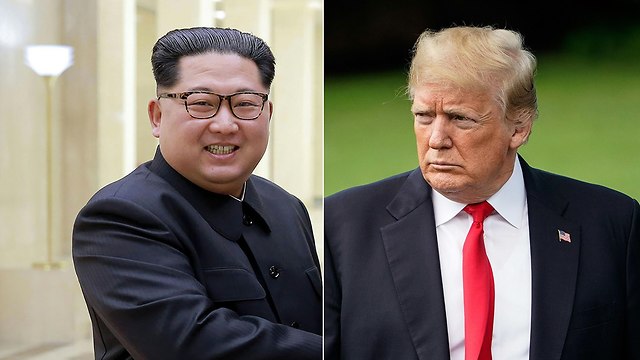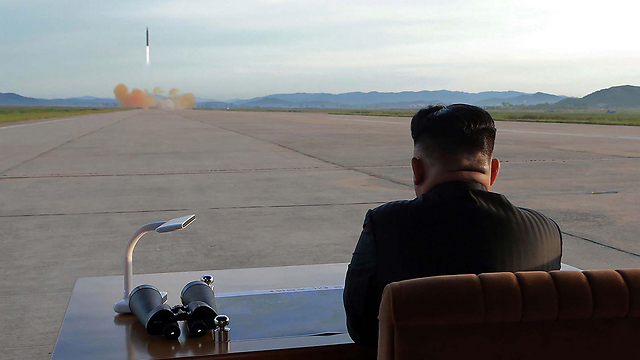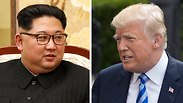

What Israel would like to achieve from Trump-Kim meeting
Analysis: In the Singapore summit, the US president will try to succeed where his predecessors failed and reach an agreement to rid the Korean peninsula of nuclear weapons; the North Korean leader, who was suffocated by Chinese sanctions, stands to gain in any event after achieving international recognition. Israel’s main interest, meanwhile, is in halting the proliferation of knowledge on non-conventional weapons.
Equally important is the fact that if he manages to formulate an agreement for the beginning of a process to denuclearize the Korean peninsula from nuclear weapons—an agreement whose execution could be secured and which would guarantee that North Korea would not back out of its commitment—Trump would be able to prove that he succeeded where former US President Barack Obama failed.
Trump wants to prove that he reached an effective agreement with North Korea, unlike the bad agreement Obama signed with the ayatollahs from Tehran. For him, that is perhaps an even more important reward than advancing international peace and security as a result of the dissolution of a dangerous center of tension in Eastern Asia.
Three American presidents before Trump tried to reach an agreement with North Korea on denuclearization and ballistic missiles threatening its neighbors, Japan and South Korea, and the United States. They all failed. In fact, there were four presidents who did that, because in the 1990s Bill Clinton appointed former President Jimmy Carter as his negotiator with Kim Jong-il, the father of the current North Korean leader, Kim Jong-un, on halting the development of nuclear weapons in Korea.
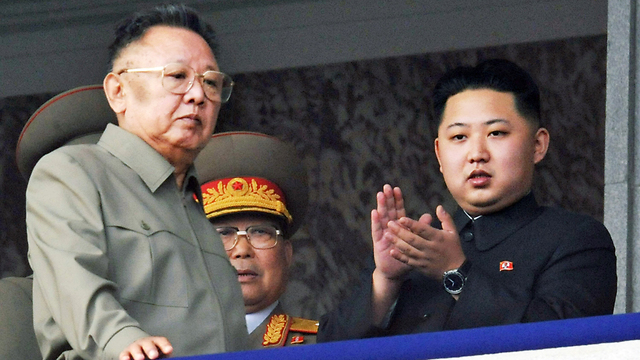
Carter reached an agreement, Clinton took pride in the achievement and Carter smiled, but North Korea resumed its development of a nuclear weapon and ballistic missiles several years later, although the US provided the full return. The Americans sent oil and food to North Korea, and Kim tossed the agreement in the garbage.
That was even before North Korea had a nuclear weapon, when it was only developing it. The same scenario repeated itself, more or less, with President George W. Bush, as well as with Obama. Obama didn’t sign an agreement with North Korea, and not because he didn’t want to. He definitely wanted to, but Kim Jong-un didn’t want to and scornfully rejected the American president’s attempt to reach out to him.

Trump will have to prove that he did what four presidents before him failed to do, and that’s almost an impossible mission. Most experts and commentators say the summit will end with an empty statement that will allow Trump to say he succeeded, without providing real assurance. Only few people say that the summit may succeed, at least partially, because North Korea is in a state of serious economic distress right now and because it has already completed its nuclear and missile program and has no need for nuclear or missile tests anytime soon.
When China lost its patience
One of the tests of the Singapore summit is whether North Korea will indeed commit to prevent the distribution of knowledge and components for a nuclear weapon, and knowledge of components for the production of ballistic missiles, to other countries.
This is where Israel comes into the picture: North Korea’s main clients at the moment are Iran and Syria, and some say Egypt is also holding secret talks with Pyongyang on nuclear knowledge and ballistic missiles. If, as a result of the Singapore summit, the North Korean leader vows to prevent the distribution of the non-conventional knowledge and weapons, it will be a great success as far as Israel is concerned.
So far, we must remember, Trump’s sympathy towards Israel has been reflected mainly in verbal and diplomatic statements and gestures which have had hardly any practical value. But if Trump receives a promise and if measures are determined to ensure that the promise is being kept, that North Korea won’t distribute nuclear knowledge and won’t distribute components and knowledge for ballistic missiles to other countries, led by Iran, it will be a very significant contribution to security.
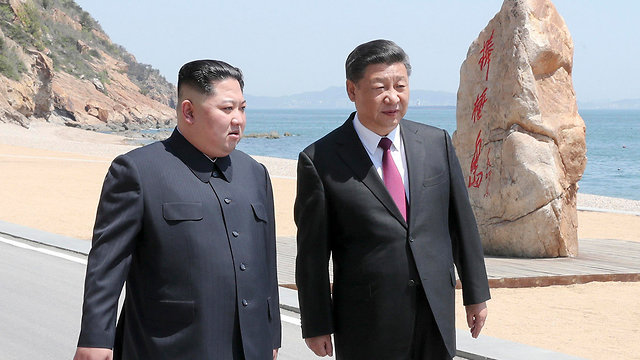
There are other aspects concerning the Middle East, and Israel’s security in particular, which will be discussed in the Singapore summit on Tuesday. It’s very important, however, to acknowledge the fact that Kim Jong-un is coming to the negotiations mainly because of the tough economic sanctions imposed on his country, which is already dealing with economic sanctions imposed by the United Nations Security Council and the US years ago.
Kim Jong-un’s grandfather, Kim Il-sung, the founder of the “Democratic People's Republic of Korea” (North Korea), adopted a “juche” policy—self-reliance on means and resources, without any external help. In the 1990s, this policy led to mass starvation in North Korea, which left hundreds of thousands of people—and some say even millions—dead.
The grandson, Kim Jong-un, wanted to avoid such a situation. He knows how to deal with UN sanctions and get around them, he knows how to deal with American sanctions and get around them, but he doesn’t know how to deal with sanctions imposed by China. In fact, the trade with China is the only thing preventing the North Korean economy from collapsing. But Trump managed to convince Chinese President Xi Jinping to join the sanctions on North Korea.
In late 2017, the Chinese did what they failed to do in the past and announced that they would stop buying coal from North Korea, making the last round of sanctions on the isolated country particularly suffocating and effective. The reason was North Korea’s tests of a hydrogen bomb and ballistic missiles capable of reaching any part of the US, and which were also performed over Japan in the summer and fall of 2017.
That was too much even for the patient Chinese, North Korea’s traditional neighbors and chief supporters. The Chinese were apparently convinced that if they failed to restrain North Korea’s young, unpredictable and aggressive leader, a war could break out in the Korean peninsula, and China would be dragged into it whether it liked it or not, and that the war might also take on a nuclear nature.
The Chinese leader, who heard the exchange of verbal blows between Trump and Kim Jong-un and realized that the situation was serious and that there was a real threat to world peace and to China, he decided to restrain “the boy.” It was effective, and it was likely the main reason the North Korean leader suddenly changed his mind in April 2018 and implied that he was willing to demilitarize the Korean peninsula of nuclear weapons in return for a commitment to remove the American forces (28,000 soldiers) from South Korean territory and an American commitment not to place a nuclear weapon on South Korean and Japanese territory.
Kim’s gain
We musn’t be misled by Kim’s smile offensive, however. He knows what happened to Libyan leader Muammar Gaddafi, who demilitarized his nuclear weapons in 2004 and was toppled in 2011. The nuclear weapons and the ballistic missiles, from the North Korean regime’s point of view, are the guarantee that the US, South Korea and Japan won’t try to bring down the tyrant regime in North Korea. So there is hardly any chance that Kim Jong-un will agree to a process in which he is required to demilitarize his nuclear weapon.
He will likely agree to a statement in principle that will talk, in general, about a demilitarization of the Korean peninsula of nuclear weapons, without setting a specific date. From Israel’s point of view, however, the important thing is what will happen with the ballistic missiles. The common belief is that North Korea can take a break from the development of ballistic missiles at this time after it has presented a proven ability to launch missiles at ranges covering the entire United States, thereby maintaining mutual deterrence with the US.
The Iranians want to reach the exact same situation, but the nuclear agreement the world powers signed with Iran doesn’t cover the issue of ballistic missiles which are still being developed by Tehran. If the “Singapore agreements” include a segment dealing specifically with the North Korean ballistic missile threat, it will be an achievement for Trump and an achievement for Israel. It will also prove that Trump, with North Korea, dealt with a problem that Obama, in his eagerness to reach a nuclear agreement, avoided handling with Iran.
If Trump reaches understandings on the beginning of a supervisable, long-term process for the demilitarization of the Korean peninsula of nuclear weapons, it will serve as proof that he was right to withdraw from the nuclear agreement with Iran (and that Prime Minister Benjamin Netanyahu was right too). The withdrawal means a resumption of the tough economic sanctions on Iran, and if it worked with Pyongyang it will likely work with Tehran too.
But that hasn’t happened yet. The meeting between the completely unpredictable Kim Jong-un and Donald Trump hasn’t taken place yet and anything could happen. It’s possible that the summit will only produce vague statements and that a long time will pass before we know if anything was actually agreed upon in the meeting and what was agreed upon.
Only one thing is clear: Kim Jong-un will gain from the Singapore summit in any event. His personal meeting with the US president constitutes an official US recognition of North Korea for the first time since 1953, the year the Korean War ended. Kim will likely receive on Tuesday what his grandfather and father failed to achieve, before we even know if he’ll give anything real in return: International recognition of his regime’s legitimacy.















